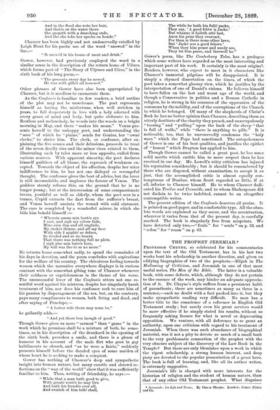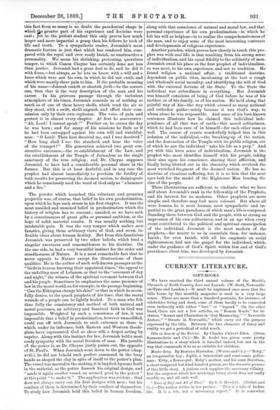THE PROPHET JEREMIAH.* PROFESSOR CREYNE, so celebrated for his commentaries
upon the text of the Old Testament, has in his last two works bent his scholarship in another direction, and given us edifying biographies of two of the prophets,—Elijah in The Hallowing of Criticism, and Jeremiah in one of that most useful series, The Men of the Bible. The latter is a valuable book, with some defects, which, although they do not pertain to the essence of the work, may hinder an adequate apprecia- tion of it. Dr. Cheyne's style suffers from a persistent habit of parenthesis ; there are sometimes as many as three in a sentence,—each no doubt with a fact packed into it, but they make sympathetic reading very difficult. No man has a. better title to the conscience of a reformer in English Old Testament study ; but surely even his great services would be more effective if he simply stated his results, without so frequently asking licence for what is novel or deprecating opposition. We venture, with all deference to so great an authority, upon one criticism with regard to his treatment of Jeremiah. When there was such abundance of biographical material, was it not a pity to devote so much of a small book to the very problematic connection of the prophet with the very obscure subject of the discovery of the Law Book in the Temple P But these are only blemishes upon a work in which the ripest scholarship, a strong human interest, and deep piety are devoted to the popular presentation of a great hero. The book is full of learning, and, like all its author writes, is extremely suggestive.
Jeremiah's life is charged with more interests for the historian of religion and the student of human nature, than that of any other Old Testament prophet. What disguises • Jeremiah : his Life and Times. By 0114011 Mayne. London: James Nisbet and Co. this fact from so many is no doubt the paradoxical shape in which 9ile greater part of his experience and doctrine were cast ; yet to the patient student this only proves how much larger and more impartial a grasp than his fellows he took of life and truth. To a sympathetic reader, Jeremiah's most dramatic feature is just that which has rendered him, com- pared with the royal and ever ready Isaiah, so unattractive a personality, We mean -his shrinking, protesting, querulous temper, to which Canon Cheyne has certainly done not less than justice. Jeremiah had a great deal to do, and he did it with force;—but always, as he lets us know, with a will and a force which were not his own, in which he did not exult, and which were mostly sheer pain to him. If the probable meaning of-his name—Jehovah easteth or shooteth forth—be the correct one, then that is the very description of the man and his career. In his grievous passage through the turbulent atmosphere of his times, Jeremiah reminds us of nothing so much as of one of thoie heavy shells, which rend the air as they shoot; with a swift, shrill anguish, and effect their corn- mission only by their own explosion. The voice of pain and protest is in almost every chapter. At first he asseverates : " Ah, Lord ! I cannot speak !" Further on, he curses the day he was born ; and for many of his missions he feels as if he had been entrapped against his own will and watchful- ness : " 0 Lord! Thon hast deceived me, and I was deceived." "How long shall I see the standard, and hear the voice of the trumpet ?" His generation achieved two great con- structive successes,—the re-establishment of the Law, and the establishment of the Temple of Jerusalem• as the single sanctuary of the true religion ; and Dr. Cheyne supposes Jeremiah to have had a considerable personal share in the former. But this is at least doubtful, and in any case the prophet had almost immediately to proclaim the futility of both results for preserving the doomed nation, to disintegrate which he consciously used the word of God only as " ahammer and a fire."
The powder which launched this reluctant and groaning projectile was, of course, that belief in his own predestination, upon which he lays such stress in his first chapter. It was the most unaided and unmixed belief in predestination which the history of religion has to recount; unaided, as we have said, by a, consciousness of great gifts or personal ambition, or the hope of solid, material results. It was usually nothing but intolerable pain. It was the very temper which makes men fanatics, giving them arbitrary views of God, and stern, in- flexible ideas about human destiny. But from this fanaticism Jeremiah was preserved by two other beliefs, which lend a singular sweetness and reasonableness to his doctrine. On the one side, he had a very beautiful instinct for the order and steadfastness of Nature. It is a most remarkable fact that he never appeals to Nature except for illustrations of these qualities. He is the author of such well-known passages as the "birds in heaven knowing their appointed times," the appeal to the unfailing snow of Lebanon, or that to the "covenant of day and night," the witness of the spiritual covenant between God and his people. Sometimes he emphasises the same presence of law in the moral world, as, for example, in the passage beginning, "Can the Ethiopian change his skin?" or that in which he scorn- fully denies, to the quack prophets of his time, that the moral wounds of a people can be lightly healed. To a man who felt thus fully the consistency and method of both natural and moral processes, an arbitrary and fanatical faith in God was impossible. Weighted by such a conscience of law, it was impossible that a belief in predestination, however unmodified, could run off with Jeremiah to such extremes as those iu which, under its influence, both Eastern and Western theolo- gians have represented God as sheer will, a despot acting by caprice. Along with this instinct for law, Jeremiah held a most ready sympathy with the moral freedom of man. His parable of the potter is, as Dr. Cheyne justly points out, the opposite of St. Paul's: When Jeremiah went down to the potter (chap. xviii.), he did not behold such perfect command in the busy hands as shaped the clay in spite of itself to the potter's plan. The vessel was marred in the making, it is implied, by some fault in the material, so tbe potter forsook bis original design, and " made it again another vessel, as seemed good to the potter " at this point to make it." The application was evident : God does not always carry out his first designs with men ; but his conduct of them is determined by their conduct of themselves. To study how Jeremiah held this belief in human freedom, along with that conscience of natural and moral law, and that personal experience of his own predestination—in which he I felt his will so helpless—is to realise the comprehensiveness of the man, and to enjoy some of the most interesting contrasts and developments of religious experience.
Another paradox, which proves how closely in touch this pro- phet was with real life, is that resulting from his strong sense of individualism, and his equal fidelity to the solidarity of men. Jeremiah owed his place as the first' prophet of individualism, as was meet, to his own experience, and not to tradition. He found religion a national affair, a traditional' doctrine, dependent on public rites, inculcating at • the best a rough and wholesale social morality, and identifying the will of God with the external fortune of the State. To the State the individual was subordinate in everything. But Jeremiah was himself conscious of being of God before he was of his mother, or of his family, or of his nation. He held along that painful way of his—the way which crossed so many national' and orthodox paths—solely because it was God's way, to whom alone he was responsible. And some of his best-known sentences illustrate how he claimed this individual inde- pendence of all that was of earth—this moral solitariness, which he had been sure of in himself—for each other man as well. The course of events wonderfully helped him in this isolation of the individual,—the breaking-up of the nation, and the destruction of the Temple with its public religion, out of which he saw the individual "take his life as a prey." And yet with this keen sense of individualism, Jeremiah is the prophet who most identifies himself with his people, taking their sins upon his conscience, sharing their affliction, and finally being blotted out in the obscurity which overtook the most wretched fragment of the doomed nation. He has no doctrine of vicarious suffering, but, it is to him that the next ages look for the model of the Righteous Man bearing the sins of the people.
These illustrations are sufficient to vindicate what we have said about Jeremiah's rank in the fellowship of the Prophets, and his interest for us moderns. Other prophets are more simple, and therefore may look more colossal. But where all were human, he is most human, most sympathetic and im- partial to the great paradoxes of which man's life is composed. Standing there between God and the people, with so strong an impression of his own solitariness, and in an age when every event'contributed to the political and spiritual emancipation of the individual, Jeremiah is the most modern of the prophets,—far nearer to us in essentials than, for instance, Isaiah; for even Isaiah, with all his emphasis on social righteousness, had not the gospel for the individual, which, under the guidance of God's Spirit within him and of God's providence about him, was developed by Jeremiah.



































 Previous page
Previous page